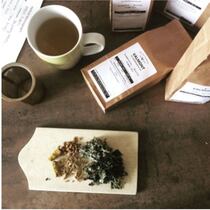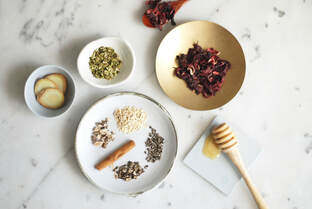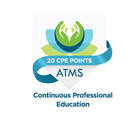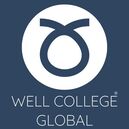- Home
-
Qualifications
- Diploma in Nutrition and Health Coaching
- Womens Health and Wellness Coach Certification
- Certified Coaching Professional Program
- Diploma in Coaching for Lifestyle & Wellbeing Management
- Holistic Wellness Coaching Program
- The Ultimate Triple Qualification
- Health Coaching Electives
- Wellness Coaching for Professionals
- Coach Gap Training
- Professional Certificate in Meal and Menu Planning
- Accreditation, Registration & Insurance Options
- Degree & Diplomas
- Short Courses
- Testimonials
- Enrol
- FAQs
- About
- Login
- Things We Do
- Contact
|
Botanical healing is a great insight into the healing power of plants, it focuses on safe and readily accessible herbs and plants to bring together a practical look at the compounds in plants and how these give rise to plant health benefits. You will review history, regulation, body systems, a wee bit of chemistry around the major constituents in plants so you can recognise their potential effect, as well as production methods and a materia medica of the major herbal remedies. You'll have the option to take an untimed quiz or create a lovely blended tea as your assessment task.
|
Note: this course is seated in herbalism and won't cover the use of plant compounds as ingredients in foods such as smoothies. This unit does not enable students to practice in the area of herbal medicine as this is three year Bachelor of Health Science degree, it will enable you to better use plants in daily life to use their health-giving benefits to the fullest.
|
KEY INFORMATION
- Timeless subjects - Flexible and online learning so you can study at your own pace
- Detailed, referenced text, with extensive practical learning actions, no outdated pre-recorded lessons and scripts
- Workbook accompanying text to apply your learning
- Credit to coaching qualification - build your coaching qualification in your timeline
- Assessments are untimed, stress-free and learning focused, not testing
- Certificate available immediately upon completion
- Can be used as an elective in the Diploma of Nutrition & Health Coaching and the Diploma of Coaching in Lifestyle and Wellbeing Management
- $350 AUD enrolment fee
- 20 hours of study
- Continuing Professional Development Points (CPD/ CEC/CPE) (ATMS) available on foundation and elective units. CLICK HERE for more detail.
COURSE CONTENT
TOPICS LISTING - BRIEF
Content Brief
The content is focused on herbs and spices and doesn't cover plant foods, this area is explored in our Super Nutrition unit. The subject covers around 50 plant remedies in total throughout, this is a mere snippet of the numbers of herbs at our disposal; the focus is on plants that are relatively easy to access, or grow, and ones considered to have a reasonably high degree of safety.
- Brief history of the evolution of herbal medicine and western herbal medicine
- World guidelines around herbal medicines and trends of use of plant medicines
- Regulation and safe practice
- The principles of herbalism and natural healing
- Review of the literature and science
- An introduction into elementary plant botany including understanding seeds, grains and cereals
- Environmental considerations, green growing practices and permaculture
- Review of human body systems - Digestive, circulatory and respiratory, endocrine, immune, integumentary, lymphatic, muscular, nervous, reproductive, skeletal and urinary
- Understanding inflammation and the immune response
- The gut and health
- Brief review of the major herbal therapeutic categories from adaptogens to nervines and more
- Review of plant chemistry, looking at alkaloids, bitters, coumarin, flavonoids, mucilage, tannins and more
- A short chemistry review, nothing too scary
- The latest scientific evidence on how plants are being used in medicine
- Introduction to plant monographs - review of evidence of notable plants with an effect on/of antibacterial, blood sugar, cancer, longevity, cognitive function, physical performance, pregnancy and lactation, stress and mood
- Plant monographs - a selection of 23 notable plant remedies, their actions, constituents, major actions and uses, and application, from basal to turmeric
- Production considerations and methods - equipment, drying, storage, quality control issues, infusions, decoctions, syrups , tinctures and the like will be explored
- External preparations including creams, steam baths and rubs, oils, washes, poultices
- Safe incorporation of herbal remedies into your lifestyle - Ayurvedic options, use of honey, and recipes
The content is focused on herbs and spices and doesn't cover plant foods, this area is explored in our Super Nutrition unit. The subject covers around 50 plant remedies in total throughout, this is a mere snippet of the numbers of herbs at our disposal; the focus is on plants that are relatively easy to access, or grow, and ones considered to have a reasonably high degree of safety.
COURSE LEARNING OUTCOMES
Students shall by the end of the course be competent in:
Assessment tasks:
This unit requires the submission of:
- Define the terms ‘herb’ incorporating aspect of the WHO definition
- Explain the level of safety and two considerations in using herbal medicines to ensure safety
- Define the basic premises of health care
- Describe the relevance of the Hippocratic Oath in health care today
- Provide a brief review of the current regulation of herbal medicines globally
- Describe the main plant structures and a function of each
- List at least six body systems that herbal medicines might act upon
- List the three independent systems in the CVS
- Name three glands in the endocrine system
- List two parts of the immune system
- Describe the main function of the lymphatic system
- Name the two parts of the nervous system
- Briefly describe the hormonal changes during the menstrual cycle in reproductive women
- Briefly describe the urinary system functions in relation to water in the body
- Define inflammation
- Explain the purpose of inflammation and its ideal end goal
- Briefly describe the two types of inflammation
- Identify the major organs that make up the gut
- Explain two potential links between the gut and health
- Describe the basic philosophy of holistic health
- List two environmental and safe ways to grow plants for harvesting
- Define the term ‘companion planting’
- Name six types of herbal remedies (classes of actions)
- Name five major compounds found in plants that are believed to have health effects
- Name two phenolic compounds found in culinary plants
- Briefly explain the reported activity of phytoestrogens as ‘balancing’ in relation to hormones
- Select one notable herbal action, eg. cancer preventative, and give at least two herbs with scientific evidence to show they work in this way
- List two internal and two external herbal preparations
- Briefly explain why making tinctures should be undertaken with great care
- List two importance aspects of quality control
- Explain why oils may have a shorter shelf life
- List two reported health benefits of honey
- List two free research databases.
- Distinguish between medicinal herbs in cultivation, including twenty-five different genera and fifty different varieties.
- Compare the chemical components of different medicinal herbs in terms of their general effect on the human body.
- Prepare simple and safe herbal remedies in a domestic situation.
- Explain the potential dangers involved in dealing with plants.
- Prepare a schedule of cultural practices for a medicinal herb crop.
Assessment tasks:
This unit requires the submission of:
- Submission of a proposed blended tea recipe OR
- Completion of an untimed quiz (open to be retaken up to three times)
COURSE 'ASSESSMENT' TASK: STUDENT EXAMPLES
GROW YOUR LOVE AND INFUSE IT....
|
CONNECT WITH US
|
Well College Global respects and acknowledges the Traditional Custodians of the Land, of Elders present, past and emerging, on which this connection between people takes place.
- Home
-
Qualifications
- Diploma in Nutrition and Health Coaching
- Womens Health and Wellness Coach Certification
- Certified Coaching Professional Program
- Diploma in Coaching for Lifestyle & Wellbeing Management
- Holistic Wellness Coaching Program
- The Ultimate Triple Qualification
- Health Coaching Electives
- Wellness Coaching for Professionals
- Coach Gap Training
- Professional Certificate in Meal and Menu Planning
- Accreditation, Registration & Insurance Options
- Degree & Diplomas
- Short Courses
- Testimonials
- Enrol
- FAQs
- About
- Login
- Things We Do
- Contact





